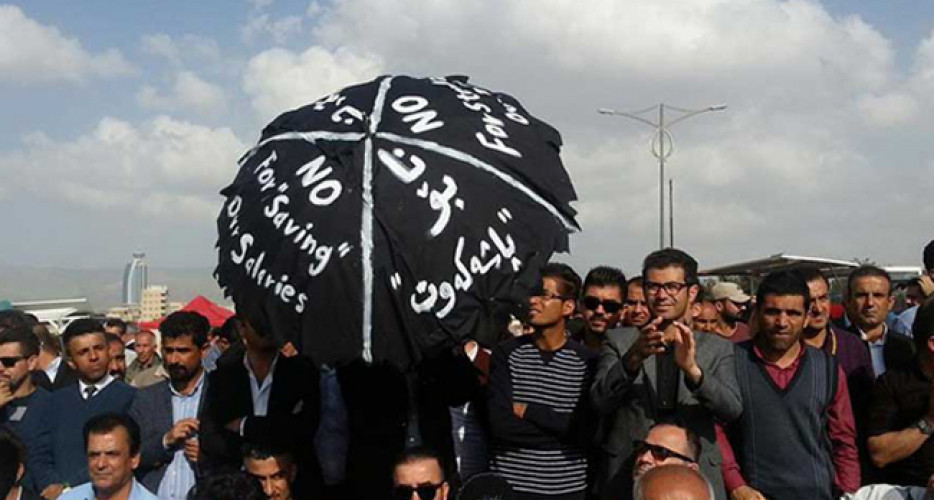
Peregraf
The Kurdistan Regional Government (KRG) owes Trifa Abdulqadir 20 million Iraqi dinars.
It was withheld from her salary as part of an austerity program, along with those of thousands of other civil servants. Although the government promised that it would pay the money back, it was unclear whether it ever would.
Abdulqadir, a 33-year-old government employee holding the rank of director, told Peregraf that portions of 30 monthly salary payments were withheld by the KRG since she started her position, with deductions ranging between 10 percent and 70 percent. Additionally, the government missed twelve monthly salary payments entirely.
The withholding program was introduced in 2014 in response to an economic crisis in the Kurdistan Region caused by a confluence of factors, including budget disputes with Baghdad and the war against Islamic State (ISIS). That specific policy ended in 2019, but the COVID-19 pandemic and the global oil price crash brought it back as an emergency measure during 2020 and 2021.
In total, she estimates that the KRG owes her 20 million Iraqi dinars or about $15,300 in back pay.
"There are ways to resolve the issue, but the government and citizens have not been concerned about it and civil servants have been silent," Abdulqadir told Peregraf.
But the situation may be changing. New amendments to Iraq’s federal budget legislation have raised hopes that the KRG will finally be forced to make good on its pledge.
On May 26, the Iraqi parliament’s finance committee voted to include a measure in the draft three-year budget that would compel the KRG to repay in monthly increments 10 percent of what it withheld from government employees.
"We have met with the finance committee of the Iraqi parliament about the withheld salaries and voted on it and included [an amendment] in the draft budget bill," said Badriya Ibrahim, an MP representing Kurdish opposition party the New Generation Movement. She added that the party’s proposal had the support of at least 60 MPs who signed a petition to include the amendment.
The government is the most important employer in the Kurdistan Region, so there are serious economic and political repercussions when the KRG is unable to make payroll.
"It started with salary delays. Then promotions were suspended under the excuse of the war against ISIS and the economic crisis," Diler Ali, a civil servant, told Peregraf.
"The living conditions of [government] employees, especially those on low salaries, were very bad. We have a lot of money withheld by the government and its fate is still unknown," he said, adding that many people went into debt to pay for basic services like electricity and water.
Ali is supposed to make 680,000 Iraqi dinars ($520) per month and estimates that the KRG owes him 13 million Iraqi dinars ($9,940).
The amount that the KRG should pay back to each civil servant depends on which ministry they work for and what level of position they hold.
"The KRG has turned withheld salaries into government debt," Hunar Jamal, a KRG spokesperson, explained to Peregraf, but it is unclear under what authority this was done.
Ziad Jabar, the finance committee’s chairperson, said that the amendment was part of a legal process to recoup some of the money taken from civil servants.
"The withholding, delays, and non-payment of salaries were illegal. The cuts were not based on any law…so this is illegal because the salaries of employees are regulated by law," Jabar told Peregraf.
Jabar added that an earlier proposal had been to open bank accounts for civil servants that would have accounted for the money that the KRG owed to them had been introduced, but the federal government did not follow up on the measure.
While the new amendment is a concrete step towards resolving the situation, it is unclear whether it will ever be implemented because of the KRG’s precarious finances.
Erbil relies on oil exports for the bulk of its budget, but those were suspended in March following an arbitration ruling from the International Chamber of Commerce (ICC). Since then, it is estimated that the KRG has lost $1.5 billion in revenue.
Therefore, it must turn to Baghdad for funding. So far, the federal government has sent 400 billion Iraqi dinars ($305 million) to the KRG, but this is not enough to pay salaries beyond May.
Iraqi Prime Minister Mohammed Shia al-Sudani has promised that money will be available to pay salaries, but Jamal Kochar, another member of finance committee, said that there will be more problems for civil servants in the Kurdistan Region if the situation is not resolved soon.
The amendments included a number of other measures, to which the Kurdistan Democratic Party (KDP) has strongly objected. Parliament was scheduled to vote on the budget on May 27, but this has been delayed.